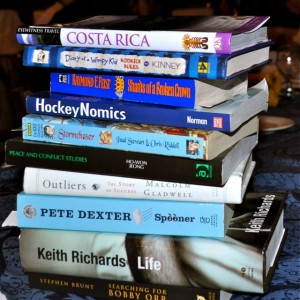What’s In A Word?
In 2010, I was accepted into the Graduate Liberal Studies (GLS) program at Simon Fraser University (SFU).
Going back to school, part-time, was one of the best decisions I’ve ever made. In addition to reentering the world of study and immersing myself again in the humanities, my status as a Masters student allowed me to apply for Teaching Assistant (TA) positions at SFU. I’ve been fortunate to serve as a TA in the Department of Humanities for four terms.
I love being a TA. I love attending lectures and brushing up on familiar subjects and topics or delving into new ones. I love the dialogue with students in tutorial — especially on those days when they decide to leap into the discussion — and I love the challenge of trying to figure out how to engage them in texts so that they see how a work that’s centuries old does have relevance to their world today.
And I love playing a role, however small, in helping them develop their writing skills. However, I’m frustrated by the general level of writing I’ve encountered in these courses especially since the participants represent the gamut of undergrad experience, from level one to level five or higher.
It’s more than a question of writing. Although we live in an age of literacy, it seems to me to be a question of reading.
Why?
 Because in a world where information is literally at our fingertips, students do not take the time to search out a reference in a literary work or to look up a word.
Because in a world where information is literally at our fingertips, students do not take the time to search out a reference in a literary work or to look up a word.
A simple check in a dictionary app or online could make all the difference in the interpretation of a passage from a primary document or a novel or a philosophical treatise.
A simple Google search can tell you more than you’d ever need to know about a name or time which adds layers of meaning to assessing an author’s intent or understanding a character.
And I find that I can pick out the words which students will most likely not have understood or not have taken the time to investigate, with eerie accuracy, even if they are what I would consider simple words for someone studying at the post-secondary level.
The latest such word was “pious”.
The professor I’m working with this term used the word during his lecture. He was talking about characters or figures who, albeit pious, face serious consequences in their lives. That is, the tragedies with which they contend are not a reflection of their personal morality, but are often a reflection of their time and the socio-cultural values of their societies. That’s a much more sophisticated analysis than saying they were “bad” or “unlucky”.
What’s in a word?
The world is in a word.
A world of meaning is embedded in a word, a world of interpretation, a world of understanding.
Words by the Bee Gees (1968)
You think that I don’t even mean
A single word I say
It’s only words and words are all I have
To take your heart away